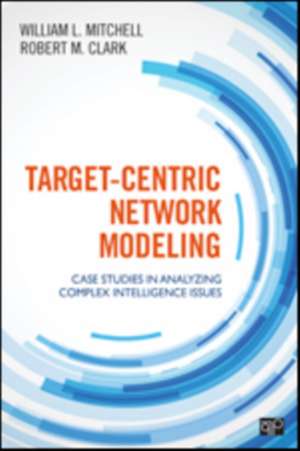Target-Centric Network Modeling: Case Studies in Analyzing Complex Intelligence Issues
Autor Robert M. Clark, William L. Mitchellen Limba Engleză Paperback – 3 iun 2015
Preț: 517.21 lei
Preț vechi: 698.93 lei
-26% Nou
98.97€ • 103.59$ • 82.37£
Carte disponibilă
Livrare economică 10-24 martie
Livrare express 22-28 februarie pentru 26.75 lei
Specificații
ISBN-10: 148331698X
Pagini: 288
Dimensiuni: 152 x 229 x 20 mm
Greutate: 0.4 kg
Ediția:1
Editura: SAGE Publications
Colecția CQ Press
Locul publicării:Washington DC, United States
Recenzii
Cuprins
Chapter 1: Introduction
The Problem Model
The Target Network Model
Sharing Target Network Models
Intelligence Sharing in Netwar
Chapter 2: Working with the Case Studies
Step 1: Read the Scenario
Step 2: Create a Problem Definition Model
Step 3: Read the Intelligence Reporting
Step 4: Create a Target Network Model
Step 5: Conduct Analysis
Step 6: Deliver Products
A Brief Example Case: Rundown Flats
Chapter 3: Narcotics and the Afghan Insurgency
Educational Objectives
Assignment
Abbreviations and Acronyms
Scenario
Intelligence Reports
Background Reading
Chapter 4: Balkans Organized Crime
Educational Objectives
Assignment
Abbreviations and Acronyms
Scenario
Intelligence Reports
Background Reading
Chapter 5: Democratic Republic of Congo Baseline
Abbreviations and Acronyms
Scenario
Intelligence Support
Chapter 6: Democratic Republic of Congo: Gray Arms Traffic
Educational Objectives
Assignment
Abbreviations and Acronyms
Scenario
Intelligence Reports
Background Reading
Chapter 7: Democratic Republic of Congo: Narcotics Traffic
Educational Objectives
Assignment
Abbreviations and Acronyms
Scenario
Intelligence Reports
Background Reading
Chapter 8: Democratic Republic of Congo: Disease Outbreak
Educational Objectives
Assignment
Abbreviations and Acronyms
Scenario
Intelligence Reports
Background Reading
Chapter 9: Democratic Republic of Congo: Likasi Chemical Plant
Educational Objectives
Assignment
Abbreviations and Acronyms
Scenario
Intelligence Reports
Background Reading
Chapter 10: International Maritime Defense Exhibition and Conference Collection Plan
Educational Objectives
Assignment
Abbreviations and Acronyms
Scenario
Intelligence Support
Intelligence Reports
Background Reading
Chapter 11: Mara Salvatrucha
Educational Objectives
Assignment
Abbreviations and Acronyms
Scenario
Intelligence Reports
Background Reading
Chapter 12: Defeating the Balamiran Transporter Erector Launcher and Radar
Educational Objectives
Assignment
Abbreviations and Acronyms
Scenario
Chapter 13: Horn of Africa
Educational Objectives
Assignment
Abbreviations and Acronyms
Scenario
Intelligence Reports
Background Reading
Chapter 14: Cyber Attack in the North Kelon Sea Region
Educational Objectives
Assignment
Abbreviations and Acronyms
Scenario
Intelligence Reports
Descriere
Students will learn how to perform the specific actions of problem definition and breakdown, target network modelling, and collaborative sharing in the service of creating a high-quality, actionable intelligence product. This book provides hands-on skill-building and application—moving from the “what” and the “why” to the “how”. The first part of the book will introduce the analytic methodology, stressing the basics of model building. The second part of the book comprises case studies with exercises that span issues/topics covering terrorism, law enforcement, military operations, cyber-security, transnational crime, and homeland security. The authors will also provide an instructor’s guide with possible solutions for the exercises (as no case has just one “right” answer).
Notă biografică
Robert M. Clark has more than five decades of U.S. intelligence community experience. A USAF lieutenant colonel (retired), Dr. Clark served as an electronics warfare officer and intelligence officer. At the CIA, he was a senior analyst and group chief responsible for developing analytic methodologies. He was cofounder and CEO of the Scientific and Technical Analysis Corporation, a privately held company serving the U.S. intelligence community. Clark holds an SB from MIT, a PhD in electrical engineering from the University of Illinois, and a JD from George Washington University. Beyond analyzing wicked intelligence issues, his passion is writing on the topic of intelligence. His books include Intelligence Analysis: A Target-Centric Approach (5th edition, 2016), The Technical Collection of Intelligence (2010), and Intelligence Collection (2014). He is coauthor, with Dr. William Mitchell, of Target-Centric Network Modeling (2015) and Deception: Counterdeception and Counterintelligence (2019); and coeditor, with Dr. Mark Lowenthal, of Intelligence Collection: The Five Disciplines (2015). Dr. Clark also develops and teaches courses for audiences in academia, national intelligence, and the military. He currently serves as an adjunct professor at the Johns Hopkins University teaching graduate courses.










